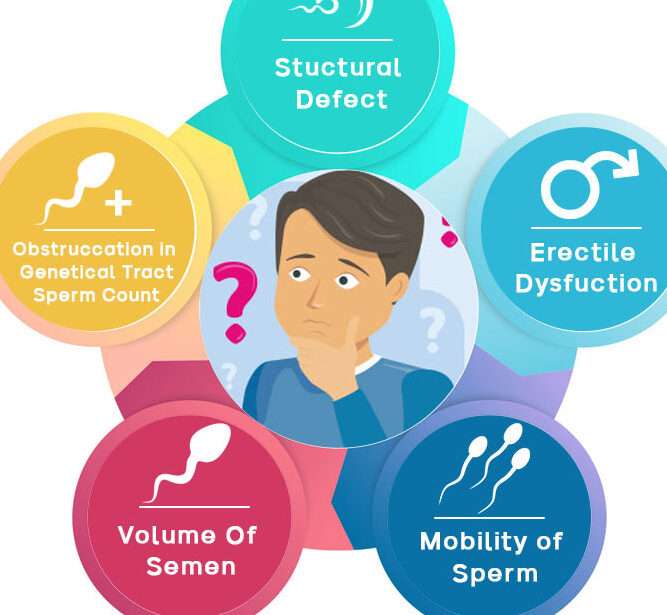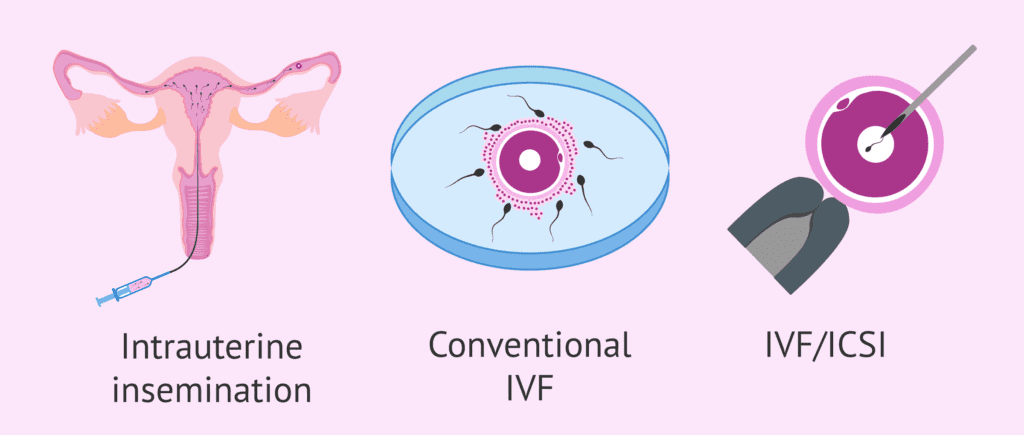- Have any questions?
- +91-98717 17305
- babiesandus12@gmail.com
Exploring the Top Reasons for Male Infertility

What Happens If You Get Pregnant 2 Months After Myomectomy
March 8, 2023
Aspermia vs Azoospermia
June 6, 2023An important decision like starting a family is frequently accompanied by enthusiasm, optimism, and expectation.
The road to motherhood, however, can be challenging and painful for some couples.
The emotional cost of infertility sometimes is too much for hopeful parents to bear.
For time unknown, infertility was associated with women. Men’s difficulties with infertility were often disregarded or overlooked. However, the severe and genuine male infertility problem affects millions of men worldwide.
Men unable to father a child may feel they have failed in their most fundamental and essential duties as men, which can result in a profound sense of loss, shame, and despair. They could find it difficult to accept their diagnosis, and they might think there is no one they can turn to.
Firstly, will have clear understanding on what is male infertility?
Male infertility is a problem in which a man has trouble or is unable to have babies because of challenges with his sperm, which can include low sperm count, poor sperm motility, irregular sperm shape, or structural issues with the reproductive system.

In this blog post, we will explore the many causes of male infertility and the male infertility treatment in Mumbai options available.
“Understanding the causes of male infertility can provide men the information they need to make wise decisions about their health and fertility,” says Dr. Hrishikesh Pai, co-founder of Babies & Us Fertility Clinic, one of the leading IVF center in Mumbai for Men and Women. “Furthermore, it can open the door to treatment and eventually lead to parenting.”
Reasons for Male Infertility
While we should not underestimate the emotional toll that male infertility can take, it is also critical to comprehend the underlying reasons for male infertility. As reason of male infertility can be attributed to a range of factors.
Some common causes of male infertility include:

Infection:
Infections can impact sperm production or quality and cause scarring that blocks the passage of sperm. Infections include inflammation of the epididymis (epididymitis) or testicles (orchitis) and some sexually transmitted diseases such as HIV or gonorrhea.
Genetic conditions:
Genetic disorders like Klinefelter syndrome (an extra X chromosome) and Y chromosomal deletions might impair sperm production or function. Genetic causes for male infertility, such as Y chromosome microdeletions and conditions like Klinefelter syndrome, can contribute to reproductive challenges in men.
Sperm duct blockage:
Sperm duct blockage may be brought on by past illnesses, trauma, or surgery.
Varicocele:
Varicocele is a condition where the testicular veins expand, which can lead to the testicles overheating and impair sperm production.
Ejaculatory issues:
Retrograde ejaculation happens when semen is directed into the bladder during orgasm instead of being expelled out of the body. Health conditions such as diabetes, spinal injuries, medications, or surgery of the bladder, prostate, or urethra can result in retrograde ejaculation.
Lifestyle choices:
Male and female fertility may also be impacted by smoking, binge drinking, drug usage, or a poor diet.
Sperm attacking antibodies:
Anti-sperm antibodies are cells of the immune system that mistake sperm as harmful invaders and attack them, which can impact fertility.
Tumors:
Tumors can affect male fertility by directly affecting the reproductive organs or glands that release hormones related to reproduction (such as the pituitary gland) or through unknown causes.
Cryptorchidism (Undescended testicles):
When one or both testicles fail to move from the abdomen to the scrotum during fetal development, it is called Cryptorchidism. Men who have had this condition are more likely to have decreased fertility.
Sexual issues:
Premature or erectile dysfunction can inhibit ejaculation during sexual activity, resulting in infertility.
Hormone abnormalities:
Hormone imbalances can lead to infertility due to testicular disorders or abnormalities that affect other hormonal systems such as the adrenal, hypothalamus, thyroid, and pituitary glands.
Defects in sperm ducts:
Various tubes carry sperm, and deficiencies of these tubes can cause blockages for several reasons, including accidental injury from surgery, trauma, prior infections, abnormal development like cystic fibrosis or inherited conditions.
Environmental factors:
Sperm production can be harmed by exposure to heavy metals, chemicals, radiation, or hot temperatures.

“The primary cause of infertility in men may be brought on by sperm production issues, hormone imbalances, or obstructions in the reproductive system,” explains renowned male infertility doctor Dr. Hrishikesh Pai. “By understanding the reasons for infertility in men, we can empower them to take charge of their reproductive health and improve their chances of creating a family.”
Now, let us examine a few types of male infertility and what they mean.
Types of Male Infertility
Numerous conditions that impact sperm generation, maturation, or delivery can result in male infertility. Listed below

are a few types of male infertility:
Azoospermia:
The absence of sperm in the semen is referred to as Azoospermia.
Oligospermia:
An oligospermia condition occurs when there is insufficient sperm in the semen.
Teratospermia:
Teratospermia is a condition that is characterized by a significant amount of abnormally shaped sperm in a man’s semen, making it challenging to fertilize an egg.
Asthenospermia:
When sperm in the semen lack strength or have low motility, it is known as asthenospermia. They may find it challenging to swim to an egg and fertilize it.
Read on to explore the steps men can take to overcome male fertility problems!
Treatments for male factor infertility
You will probably both need to consult a doctor since many infertile couples have more than one cause of infertility. Finding the reason for infertility may need a variety of male infertility test. Once the male infertility specialist in Mumbai understands your reproductive condition with the help of a male fertility test (multiple tests may be required in some cases), treatment of male infertility options include:
Medications:
The treatment of hormonal imbalances or infections that may impact sperm production or quality may involve the use of specific drugs.
Surgery:
In situations of non-obstructive Azoospermia, surgery may be required to remove obstructions, treat varicoceles (enlarged scrotal veins), or extract sperm from the testicles.
Assisted Reproductive Techniques (ART):
- Your fertility expert may employ ART techniques like IUI (Intrauterine Insemination) or IVF (In Vitro Fertilisation) to solve some fertility problems.
- Sperm can be extracted from the testes or epididymis and used in ICSI (Intracytoplasmic sperm injection) if there is no sperm in the semen. These techniques include percutaneous epididymal sperm aspiration (PESA) and testicular sperm extraction (TESE).

Numerous advanced treatments are available at Babies & Us Fertility, a renowned IVF center in Mumbai for female and male factor infertility. Our highly qualified experts provide treatments in accordance with your reproductive issues. The etiology of male infertility can stem from multiple factors, including genetic, environmental, lifestyle, and medical influences, which collectively contribute to impaired sperm production, quality, and function.
Dr. Pai is a well-known doctor for male reproductive organ who is specializes in providing expert care for conditions like male infertility, erectile dysfunction, and prostate health.
Please remember: Age can also impact the quality and quantity of our reproductive elements, due to which many individuals aiming for future parenthood can opt for Cryopreservation to preserve their fertility.
FAQ
Q. Can Male infertility be cured?

A- Male infertility may or may not be curable, depending on the underlying cause of the problem. Male infertility can sometimes be treated medically or surgically, but in most cases, assisted reproductive technology (ART); for instance, IVF, is the preferred method. Visit Babies & US, one of the best fertility clinic for men for advanced treatments
Q. Is male infertility permanent?
A- Depending on the underlying cause, male fertility is not always permanent and may be curable. Your doctor may suggest a combination of treatments if the issue causing the infertility is curable.
Many couples may consider the option of using donor sperm in situations where the sperm of the male partner is not available.
Q. Is infertility more common in males or females?
A- According to studies:
- One-fourth of cases of infertility constitute problems with male reproduction
- One-fourth by problems with female reproduction
- One-fourth by issues with both male and female reproduction
- One-fourth by unexplainable reasons
Q. How common is male infertility
A – Male infertility is a relatively common issue, affecting a significant number of couples worldwide. However, the prevalence and frequency of male infertility can vary depending on various factors such as geographical location, age groups, and lifestyle choices.
Q. What are the signs a man is fertile?
A- Signs of male fertility include healthy sexual function, sufficient sperm production, normal semen analysis results, absence of reproductive disorders or anatomical abnormalities, and regular production of healthy sperm.
Q. What are the signs of infertility in males?
A- Signs of male infertility include abnormal semen analysis results, sexual function difficulties, testicular pain or swelling, hormonal imbalances, and underlying medical conditions.




